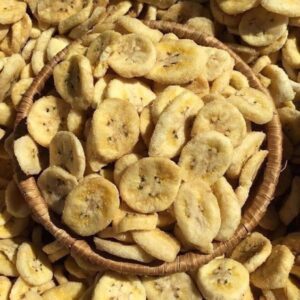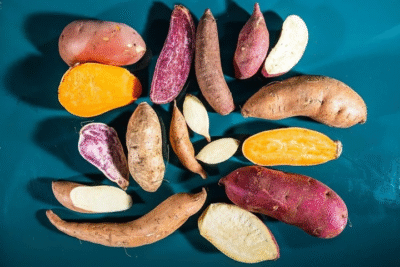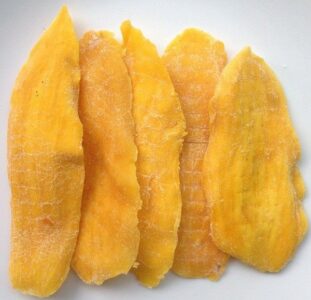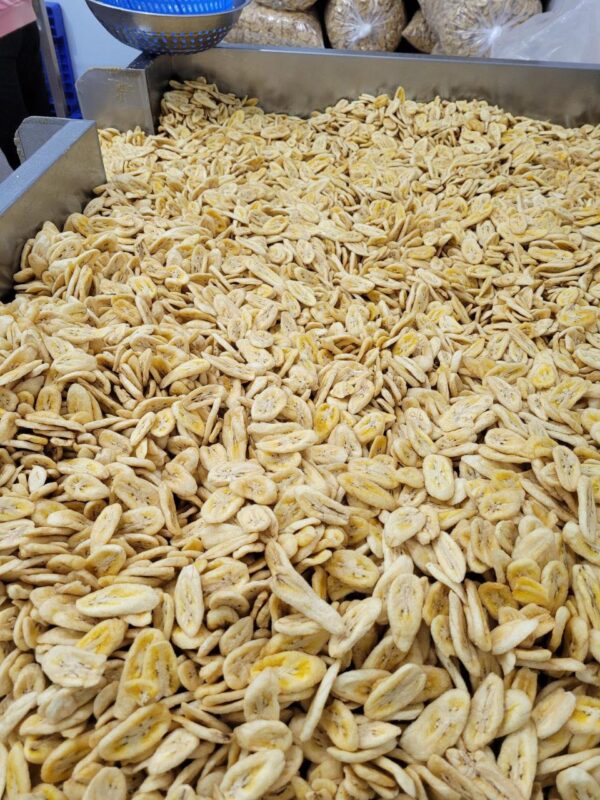Last updated on October 28th, 2025 at 05:37 am
Introduction
For B2B importers looking to launch private label banana chips, the manufacturing process and supplier capabilities are critical. According to a 2024 peer-review study, banana chips production from unripe bananas uses either deep frying in palm or coconut oil or hot-air drying, and these choices influence texture, oil absorption, and shelf life. EKB Journals
Selecting the right manufacturing partner means verifying technical data, oil type, processing parameters, and exporting readiness. This guide walks you through those factors using data-driven benchmarks and actionable criteria linked to dried banana product page at Qualitex Global.

What to Look for in a Private Label Banana Chips Supplier
When you evaluate a manufacturer for private label banana chips, focus on these criteria:
Oil specification and frying quality
The frying oil’s smoke point matters. For example, unrefined coconut oil has a smoke point around 177 °C (350 °F), less ideal for high-temperature frying compared to palm oil, which has a typical smoke point near 235 °C (455 °F). Wikipedia+1
Why it matters: A lower smoke point may lead to faster oil degradation, off-flavours, and shorter shelf life. Ensure your supplier provides oil technical sheets and specifies oil change frequency.
Moisture and oil uptake control
In high-quality banana chips, finished moisture content typically targets ≤ 3 % to ensure crisp texture. A manufacturer should also disclose average oil uptake in the 25-35 % range (oil weight as percentage of finished chip).
Why it matters: Higher moisture or oil uptake can lead to softness, rancidity risk and unsatisfactory texture for premium private label products. See also are dried bananas healthy.
Batch traceability and food safety certifications
Look for certifications such as HACCP and ISO 22000, and supplier ability to trace raw bananas from plantation to finished pack.
Why it matters: These systems reduce risk of contamination, ensure export compliance in target markets, and support brand claims for safety and quality.
Flexible packaging & private label support
Ensure the manufacturer offers flexible pouch sizes, vacuum or nitrogen flush packaging, barrier films and clear lead times (e.g., sample in 14 days, production in 25–30 days).
Why it matters: For private label programs you will need consistent brand presentation, SKU variations and minimum downtime between launches.
Export documentation and logistics readiness
Confirm that the supplier can provide Certificate of Origin, Phytosanitary Certificate, and adheres to your target market’s import regulations (for example oil source labeling, allergen declarations).
Why it matters: Missing or incorrect documentation can delay customs clearance and damage your supply chain reliability.
Manufacturing Specifications for Private Label Banana Chips
Here is a data table with sample specifications you should request when building your private label banana chips product.
| Parameter | Typical Target Specification | Importance |
|---|---|---|
| Finished moisture (%) | ≤ 3.0 % | Ensures crispness and shelf stability |
| Oil uptake (% of chip weight) | 25-35 % | Affects texture, mouth-feel and cost effectiveness |
| Frying temperature | 150-170 °C | Supports desired texture without excessive oil breakdown |
| Smoke point of oil used | ≥ 200 °C for safe margin | Prevents off-flavours and safety risks |
| Packaging shelf life | 12-18 months (when stored ≤25 °C, RH < 60 %) | Matches retail lead-times and reduces waste |
Using these benchmarks gives you a clearer specification to share with your supplier and to evaluate sample batches.
Production Process Overview
A typical private label banana chips production workflow includes:
- Raw banana procurement – usually mature green bananas of Cavendish or local variety, free of major defects.
- Slicing to uniform thickness (commonly 2-3 mm) for even frying.
- Pre-treatment – optional soaking in citric acid solution (1 % for 3-5 min) to prevent browning. EKB Journals
- Frying – slices deep fried in selected oil at controlled temperature (150-170 °C) for 2-4 minutes until a moisture target is met.
- Cooling and de-oiling – chips drained on mesh belts, excess oil removed.
- Drying/Dehydration – if applicable, hot-air dehydration may be used to reduce residual moisture further.
- Quality testing – including moisture, a W, oil uptake, free fatty acids in oil, microbial counts.
- Packaging – barrier film, nitrogen flush or vacuum seal, printed with private label branding; packed in export cartons.
- Export – loading into container with proper documentation, storage temperature controlled (≤ 25 °C recommended).
This workflow must be well documented by your manufacturer and available for audit or sampling.
Packaging, Storage and Logistics for Private Label Banana Chips
Packaging, storage and logistics have major effects on product quality and brand performance. Some key considerations:
• Packaging film specification – use multi-layer barrier film with oxygen transmission rate (OTR) ≤ 50 cm³/m²/day and moisture vapour transmission rate (MVTR) ≤ 3 g/m²/day for optimal shelf life.
• Storage conditions – recommended storage at ≤ 25 °C and relative humidity < 60 %; higher temperatures or humidity accelerate oil oxidation.
• Transport lead-time – for export shipments it is advisable to aim for door-to-door transit times under 30 days, and to plan inventory accordingly.
• Labelling and SKU flexibility – ensure your private label supplier supports both standard sizes (e.g., 100 g retail bags) and bulk formats (e.g., 5 kg pouches) depending on channel.
For more on export packaging readiness, check export banana packaging Vietnam.
Quality Assurance and Private Label Branding Tips
When building a private label product with a supplier, you should:
- Request batch lab reports showing moisture, oil uptake, peroxide value of oil and microbial counts.
- Conduct sensory testing – evaluate crispness (force in Newtons), oil flavour, residual banana sweetness and colour uniformity.
- Specify your branding requirements – bag gloss/matte finish, resealable zip, brand logo tolerance, shelf presentation.
- Ask for shelf-life test results covering 0-6-12 months at 25 °C and customer market conditions.
- Audit the manufacturing site or request virtual walkthroughs showing hygiene, slicing and frying equipment, oil management and cleaning records.
Building a strong private label partnership means you treat the supplier as a strategic co-partner rather than just a vendor.
Conclusion
Choosing a private label banana chips manufacturing partner involves more than cost. It requires attention to oil selection and fry process, moisture and oil-uptake specifications, packaging integrity, brand flexibility and export logistics. By specifying the targets above, verifying supplier data and aligning your branding vision, you can launch a quality-driven snack line with confidence.
If you want to import premium banana chips with private-label support, custom packaging and export-ready supply, consider a reliable OEM/ODM manufacturer such as Qualitex Global. For inquiries about importing high-quality banana chip products contact Qualitex Global.
FAQ Section
Q1: What oil type should I request for my banana chips manufacturing?
Choose an oil with a smoke point of at least 200 °C and stable by-life under repeated frying. For example, palm oil typically delivers higher smoke point and thermal stability compared to unrefined coconut oil (≈ 177 °C). OSU Extension+1
Q2: How long will private label banana chips remain crisp and fresh?
Under ideal conditions (moisture ≤ 3 %, oil uptake 25-35 %, packaged under barrier film, stored ≤25 °C & RH < 60 %), shelf life can reach 12-18 months. Keep in mind logistics and storage impact final quality.
Q3: What key specifications should I include in my product brief?
Include finished moisture target (≤3 %), oil uptake (25-35 %), frying temperature (150-170 °C), oil type and oil change policy, barrier pack film specs (OTR/MVTR), and export lead-time.
Q4: Does private label mean I can specify packaging sizes and labels?
Yes. A strong private label partner offers flexible pouch sizes (e.g., 100 g, 500 g, 5 kg), custom branding, and supports both retail and bulk formats. Verify lead time for custom packaging.
Q5: What should I ask about the manufacturer’s quality assurance process?
Request Batch Lab Reports (moisture, oil absorption, peroxide value), audit records, slicing and frying equipment specs, HACCP/ISO certificates and sample sensory test results. These steps ensure consistent product performance.









